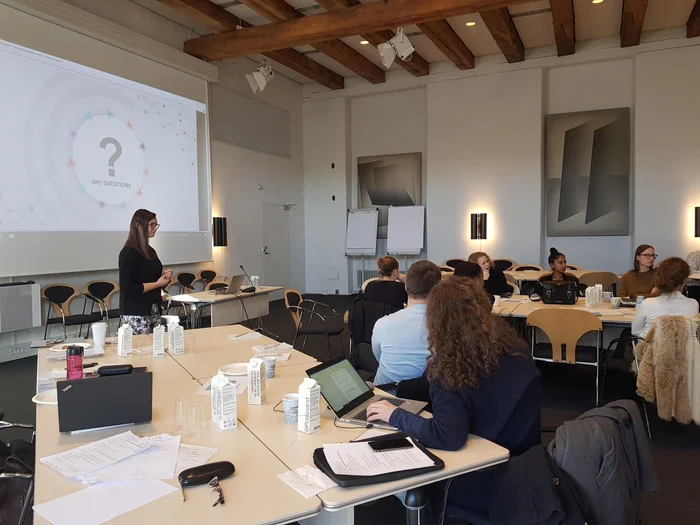IATI supports Danish CSOs to publish IATI data
This post was written by Amy Silcock, IATI Business and Data Analyst who visited the Danish Government’s Ministry of Foreign Affairs with IATI Technical Lead, Wendy Thomas.
On 5 February, IATI joined a workshop hosted by the Danish Government’s Ministry of Foreign Affairs (MFA) for civil society organisations (CSOs). IATI technical experts provided training to CSOs to enable them to publish data on their development and humanitarian projects according to the IATI Standard.
The Danish MFA intends to use IATI data published by CSOs to track when they receive government aid.
The Danish MFA intends to use IATI data published by CSOs to track when they receive government aid. This will eliminate the burden on CSOs to report this information separately to the MFA, and the MFA will instead directly import CSOs’ IATI data directly into their government systems. This feeds into IATI’s mantra to ‘publish once and use often’.
Exploring the value of publishing IATI data
At the workshop, participants spent some time exploring the value of publishing IATI data and ways in which it is being used. IATI shared some examples of external researchers and journalists using IATI data in their investigations, and developing country governments using IATI data to find which CSOs are operating in their country (see case study from Madagascar).
The group also discussed how CSOs are using their own IATI data internally. Oxfam Novib provides a great example, having created an online platform to show an overview of the projects that Oxfam offices are working on. Caritas Europa are trialing a similar project, allowing their member organisations to populate their platform with IATI data.
During the workshop, CSO participants were particularly interested to understand how IATI data could be used to demonstrate which countries they are working in, which partners they are working with and what is the impact of their work.

Amy Silcock, IATI Business and Data Analyst at CSO workshop.
Explaining the process of publishing IATI data
Publishing IATI data can be complex and present challenges to organisations. It requires mapping the organisation’s internal data to the IATI Standard and transforming it into the correct format. At the workshop, IATI technical experts were on hand to answer questions about the Standard and how data can (or should) be structured. IATI also sign-posted further support including the IATI Technical Team’s Helpdesk: [email protected] and online publishing guidance.
During the workshop, CSOs were keen to understand more clearly the elements and attributes of the IATI Standard and the way in which the Danish MFA wanted their data to be structured. One question was around whether there was an expectation for CSOs to anonymise their data when there are security concerns.
Harmonising IATI reporting requirements from different donors
CSOs also raised the challenge of meeting the different IATI reporting requirements from different government donors. By way of background, an increasing number of donors are encouraging (or have made it mandatory) for CSOs receiving government aid to publish data to IATI. However, different donors have set slightly different requirements on what IATI data to publish.
Specifically, participants said it would be helpful for donors to harmonise their reporting requirements on:
- the frequency of publishing IATI data;
- requiring results and SDG data (some do not);
- how to refer to other organisations they are working with;
- how to report data on overhead costs, and
- how to show core, softly-earmarked and earmarked funding.
The IATI Team is always on hand to support donors who are developing their IATI reporting guidance to ensure they are in-line with the IATI Standard. The team is also keen to support a dialogue between different donors who may be interested in harmonising their expectations of CSOs.